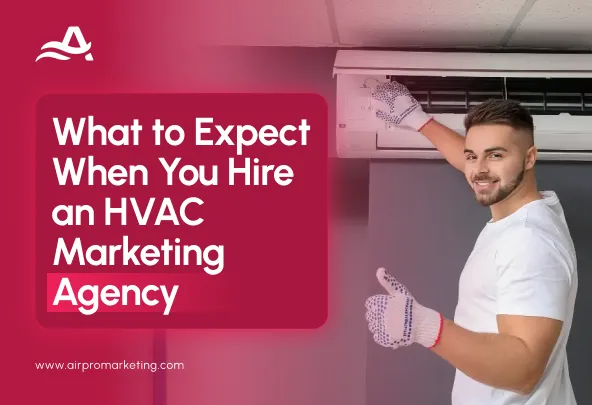Hiring an HVAC marketing agency means adding expert marketers to your team who understand both digital strategies and the unique challenges of the heating and cooling industry. As a busy HVAC business owner, you’re already juggling technician schedules, customer service, inventory management, and dozens of other responsibilities. Marketing often falls to the bottom of the priority list, especially during your busiest seasons when you need new customers most.
The U.S. HVAC services market is predicted to see an increase in value from $25.6 billion as the industry in the U.S. is set to increase by almost 7% during 2019-2029. This growth means more opportunity, but also more competition for customer attention. A specialized HVAC marketing agency fills this gap by taking over your digital marketing completely. They handle everything from your website and Google search presence to online ads and social media.
The right agency partnership feels less like hiring a vendor and more like adding a marketing department that already understands seasonal demand fluctuations, emergency service promotions, and how homeowners search for HVAC solutions. They know when to push AC maintenance before summer heat waves and when to highlight heating system replacements before winter sets in.
Industry-Specific Expertise You Can Expect
A specialized HVAC marketing agency brings knowledge that generic marketing firms simply can’t match. These agencies understand the seasonality of your business, the competitive landscape, and customer behavior patterns unique to heating and cooling services.
When evaluating potential partners, look for agencies that demonstrate:
- Experience working with multiple HVAC businesses in various markets
- Knowledge of technical terminology and common service offerings
- Understanding of local licensing requirements and industry regulations
- Familiarity with typical customer journeys from problem awareness to service calls
- Recognition of peak seasonal demands and how to capitalize on them
This specialized knowledge allows them to create more effective messaging that resonates with homeowners and business managers seeking HVAC solutions. Rather than generic marketing approaches, they can speak directly to the concerns and needs of your potential customers.
You’ll notice this expertise reflected in their proposals and strategy discussions. Instead of general marketing jargon, they’ll discuss specific tactics like “summer AC maintenance campaigns” or “emergency heating repair ads for winter deployment.” This industry-specific language demonstrates their understanding of your business model and customer base.
5 Comprehensive Digital Marketing Services
Most HVAC marketing agencies offer a full suite of services designed to work together, creating a cohesive online presence that generates leads year-round. Here’s what you can typically expect:
1. Search Engine Optimization (SEO)
The agency will optimize your website to rank higher in local searches for HVAC services. They’ll focus on several key strategies:
- Local SEO to dominate “near me” searches in your specific service area
- Technical SEO improvements to ensure your website loads quickly on all devices
- Content optimization focusing on high-value HVAC service keywords
As of March 2025, Google represented 79.1% of the global online search engine market on desktop devices. This dominance makes Google optimization the primary focus for most HVAC marketing agencies, though they’ll also ensure your business performs well on other search platforms.
Technical improvements are particularly important since the majority of HVAC service searches now happen on mobile phones, often in urgent situations when systems fail. The agency will also manage your Google Business Profile to improve visibility in map searches, which are critical for local service businesses.
2. Pay-Per-Click (PPC) Advertising
For immediate visibility, agencies implement targeted ad campaigns on platforms like Google Ads. These campaigns are geo-targeted to focus exclusively on your service areas, ensuring you don’t waste money advertising to people outside your coverage zone.
Seasonal ad adjustments promote heating or cooling services at appropriate times, maximizing your marketing budget when demand is highest. Emergency service ads are designed specifically to capture urgent repair needs when systems fail during extreme weather.
PPC strategies typically include:
- Emergency repair campaigns targeting urgent needs
- Seasonal maintenance promotions timed to ideal service windows
- Retargeting campaigns to reconnect with previous website visitors
- Equipment replacement ads targeting homeowners with aging systems
PPC delivers faster results than organic methods but requires ongoing investment. A good agency continuously optimizes these campaigns to improve your return on ad spend.
3. Website Design and Optimization
Your website serves as the hub of all marketing efforts. Agencies ensure they effectively convert visitors into leads through Website Design and Optimization by:
- Creating mobile-responsive designs that work seamlessly on phones and tablets
- Implementing clear call-to-action buttons and contact forms
- Setting up appointment scheduling tools for customer convenience
- Improving page load speed and user experience
- Adding trust indicators like reviews, certifications, and guarantees
Technical improvements directly impact both user experience and search rankings. Adding social proof elements helps convert hesitant visitors into confident leads by demonstrating your reliability and expertise.
Expect recommendations for website improvements early in the relationship, as your website’s effectiveness impacts all other marketing efforts.
4. Content Marketing
Quality content establishes your expertise and attracts potential customers. Agencies create valuable blog posts addressing common HVAC questions and concerns that homeowners and business owners have about their systems. These articles help position your company as knowledgeable and trustworthy.
Content strategies focus on:
- Seasonal maintenance guides and energy-saving tipskk
- Troubleshooting articles for common HVAC problems
- Equipment comparison guides to aid purchase decisions
- Local climate considerations specific to your service area
Many agencies also produce videos demonstrating simple maintenance procedures, which help engage visual learners and build trust with potential customers. Infographics explaining complex HVAC concepts make technical information more accessible to the average homeowner.
5. Social Media Management
While HVAC isn’t naturally “social,” effective agencies use these platforms to:
- Share helpful tips and seasonal reminders
- Showcase completed projects and satisfied customers
- Promote special offers and financing options
- Build community connections through local engagement
- Respond to customer questions and reviews
Agencies use social platforms to promote special offers and financing options, particularly before peak seasons. They also focus on building community connections through local engagement, which is particularly important for service businesses that rely on neighborhood reputation.
Perhaps most importantly, they monitor and respond to customer questions and reviews, helping manage your online reputation and demonstrating your commitment to customer service.
The Engagement Process: What to Expect
Working with an HVAC marketing agency follows a predictable pattern that helps ensure success:
1. Discovery and Assessment
In the initial phase, the agency will:
- Analyze your current online presence and marketing efforts
- Research your local competitors and market position
- Identify your ideal customer profile and service areas
- Discuss your business goals and growth targets
- Audit your website’s performance and lead generation capabilities
This foundation-building stage typically takes 1-2 weeks and should involve detailed discussions with your team to understand your business thoroughly.
2. Strategy Development
Based on their findings, the agency develops a customized marketing plan:
- Prioritized recommendations based on your specific needs
- Budget allocation across different marketing channels
- Timeline for implementation and expected results
- Key performance indicators (KPIs) to measure success
- Seasonal adjustments to capitalize on peak demand periods
Expect a formal presentation of this strategy with opportunities for your input and refinement.
3. Implementation and Launch
Once the strategy is approved, the agency begins execution:
- Setting up tracking systems to measure results
- Creating initial content and campaign materials
- Building or optimizing your website as needed
- Establishing baseline metrics for future comparison
- Launching initial campaigns on priority channels
This phase typically takes 2-4 weeks, depending on the scope of work required.
4. Ongoing Management and Optimization
Marketing is never “set and forget.” Expect continuous management, including:
- Regular monitoring of campaign performance
- Adjustment of keywords, ad copy, and targeting
- Fresh content creation to support seasonal goals
- A/B testing to improve conversion rates
- Scaling successful initiatives while pausing underperforming ones
5. Reporting and Communication
Transparent reporting helps you understand the value of your investment:
- Monthly performance reports showing key metrics
- Regular strategy calls to discuss results and adjustments
- Analysis of lead quality and conversion rates
- Recommendations for future improvements
- ROI calculations based on your average job value
The best agencies focus on business outcomes like leads and booked jobs rather than vanity metrics like impressions or clicks.
Results and Timeline Expectations
Understanding realistic timelines helps set proper expectations:
- Immediate (1-30 days): PPC campaigns begin generating leads, website improvements are implemented, and social media profiles are enhanced
- Short-term (1-3 months): Increased website traffic, improved conversion rates, growing social media following, initial SEO improvements
- Medium-term (3-6 months): Significant organic search ranking improvements, consistent lead flow, reduced cost per lead, established content library
- Long-term (6+ months): Dominant local search presence, steady lead generation across channels, established brand recognition, declining customer acquisition costs
The potential return on investment can be substantial. In one remarkable case study, a Florida HVAC company generated $90,121 in new customer revenue from SEO and $17,000 from a single email newsletter during the slowest month of the year, achieving a 32:1 ROI.
Selecting the Right Agency for Your Business
When evaluating potential marketing partners, look beyond flashy presentations to key indicators of quality and fit. The agency should have demonstrable HVAC industry experience with case studies showing measurable results for businesses similar to yours.
Key factors to consider include:
- HVAC industry experience and case studies showing measurable results
- Clear, transparent pricing with no hidden fees
- Defined communication protocols and accessibility
- Contract terms that protect both parties without excessive lock-in
- Cultural fit with your team and business values
Clear, transparent pricing with no hidden fees is essential for building trust. The agency should be able to explain exactly what services are included and how additional costs might arise. Defined communication protocols and accessibility ensure you’ll know who to contact and how quickly to expect responses when issues arise.
Consider whether the agency keeps its work in-house or outsources to freelancers and contractors. While neither approach is inherently better, knowing who will actually be handling your marketing matters. Contract terms should protect both parties without excessive lock-in periods, allowing you to exit the relationship if results don’t materialize.
Final Call
Partnering with an HVAC marketing agency can transform your business growth trajectory by bringing specialized expertise, comprehensive digital strategies, and measurable results to your marketing efforts. The right agency becomes a valuable extension of your team, handling the complexities of online marketing while you focus on delivering exceptional HVAC services.
Tired of marketing agencies that don’t understand the difference between a condenser and an evaporator? At Air Pro Marketing, we speak your language because we live and breathe HVAC. Our clients see real results, not just website visitors, but actual service calls from customers who need what you offer.
When you work with us, you get a marketing partner who understands your business challenges. We know you’re busiest when it’s scorching hot or freezing cold, so we’ve designed our processes to require minimal time from you while maximizing your return.
Call us for a free, no-pressure consultation. We’ll show you exactly what we can do for your service area and how quickly you’ll see results!
FAQs
How much does an HVAC marketing agency typically cost?
Most HVAC marketing agencies charge between $1,500-$5,000 monthly, depending on your service area size and growth goals. This typically includes website management, SEO, social media, and some advertising management. Ad spend is usually separate, with budgets starting around $1,000 monthly for local campaigns. Some agencies offer performance-based pricing where fees are partially tied to lead generation results.
How long before I see results from marketing efforts?
Paid advertising typically generates leads within the first week of launching campaigns. SEO improvements take longer, with noticeable ranking improvements in 3-4 months and significant results in 6 months. Website conversion improvements can show results within 30 days. The most effective approach combines short-term tactics (PPC) with long-term strategies (SEO) to generate immediate leads while building sustainable organic growth.
Who creates the content for my HVAC business?
Most agencies handle content creation internally, including writing blog posts, creating graphics, and producing videos. The best agencies conduct initial interviews with your technical team to capture your expertise and service approach, then create content that accurately represents your business. You’ll typically review and approve content before publication, but good agencies minimize the time required from your team.
What information will the agency need from my HVAC business?
Expect to provide service area boundaries, details about your services and pricing structure, technician certifications, equipment brands you work with, and any unique selling points. The agency will also need access to existing platforms (website, Google Business Profile, social accounts) and analytics data. Most importantly, they’ll need a point person at your company who can answer questions and provide timely approvals for campaigns and content.
Author Profile
Latest entries
 Digital MarketingMay 22, 2025What to Expect When You Hire an HVAC Marketing Agency?
Digital MarketingMay 22, 2025What to Expect When You Hire an HVAC Marketing Agency? Digital MarketingApril 28, 2025What is the Best Google Ads Campaign for HVAC Companies?
Digital MarketingApril 28, 2025What is the Best Google Ads Campaign for HVAC Companies? Digital MarketingApril 25, 2025Why is Web Development Important for HVAC Companies?
Digital MarketingApril 25, 2025Why is Web Development Important for HVAC Companies? Digital MarketingApril 25, 2025What are the Best Web Development Practices for HVAC Businesses?
Digital MarketingApril 25, 2025What are the Best Web Development Practices for HVAC Businesses?




